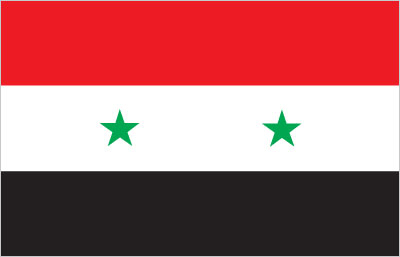Most travellers must have a visa to enter Syria; the only exceptions are citizens of Arab countries. Obtain a visa before arriving at the border, preferably in your home country, well before your trip. Avoid applying in a country that's not your own or that you don't hold residency for as the Syrian authorities don't like this. At best they'll ask you for a letter of recommendation from your own embassy (often an expensive and time-consuming proposition); at worst, they'll turn you down flat. US citizens should be aware that many US embassies abroad have a policy of not issuing letters of recommendation - leading to the ridiculous situation where they issue letters stating that they don't issue letters of recommendation. If your home country doesn't have a Syrian embassy or consulate, there's no problem with you applying in another country; alternatively you can obtain a visa on arrival.
Officially, the Syrian embassy in Amman issues visas only to nationals and residents of Jordan and to nationals of countries that have no Syrian representation. So, if you are from a country such as the UK, the USA or France, all of which have a Syrian embassy, you will not be able to get a Syrian visa in Jordan. That said, we have received recent reports that citizens without Jordanian residence were obtaining single-entry Syrian visas in Amman for JD82.50.
In Turkey, you can get Syrian visas in both Ankara and Ä°stanbul, but you'll need a letter of recommendation from your embassy. There is no Syrian embassy in Lebanon.
There are three types of visa: transit, single entry and multiple entry. Transit visas are only good for airport stays, so most travellers will need a single- or multiple-entry visa. Both are valid only for 15 days inside Syria and must be used within three months of the date of issue. Don't be misled by the line on the visa stating a validity of three months - this simply means the visa is valid for presentation for three months. You'll usually require two photographs and have to fill out two forms.
The cost of visas varies according to the reciprocal agreement Syria has made with your home country. For example, UK citizens pay UK£32 for a single-entry visa, US citizens US$100 and Australian citizens A$41. If you book travel arrangements through a foreign tour operator that has a working relationship with a Syrian operator, you are entitled to a free visa, collectable at the point of entry.
Visas at the border
If there is no Syrian representation in your country, you can obtain a visa on arrival at borders, airports or ports. Otherwise you MUST secure a visa in advance. The only official exception is for travellers entering Syria from Lebanon; if you have a valid Lebanese visa, a Syrian visa will be issued without problem on the border - for a charge. This rule also applies to holders of single-entry visas who cross over from Syria to Lebanon and then return to Syria.
Visa extensions
If you're staying in Syria for more than 15 days you'll have to get a visa extension while in the country. This is done at an immigration office, which you'll find in all main cities. The length of the extension appears to depend on a combination of what you're willing to ask for and the reason you cite for wanting the extension, eg travel or work. They are usually only granted on the 14th or 15th day of your stay, so if you apply earlier expect to be knocked back. The specifics vary from place to place but there are always a couple of forms to complete and you need two to six passport photos. The cost is never more than US$1.
